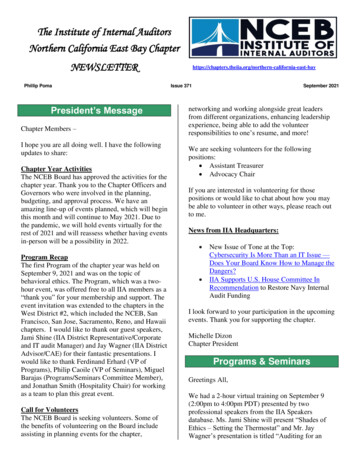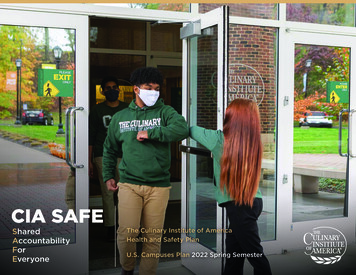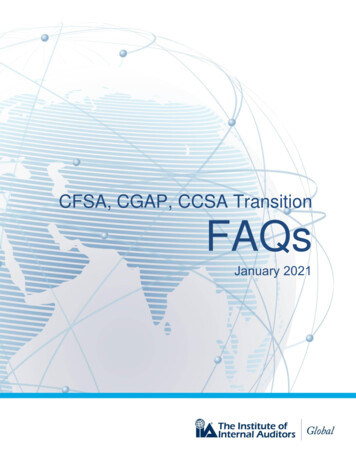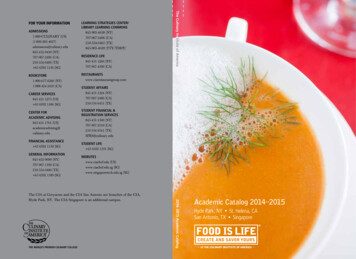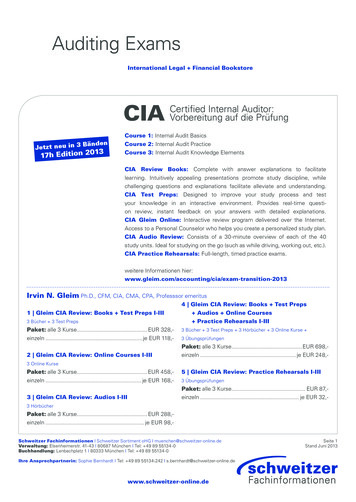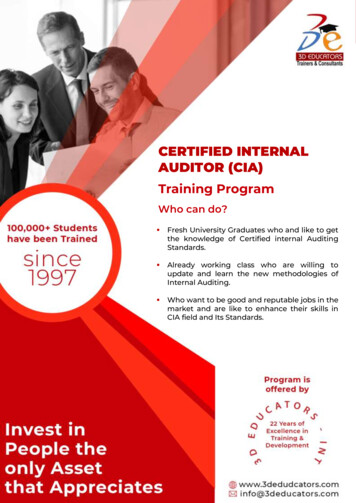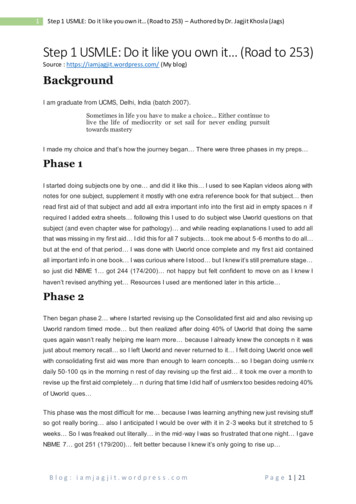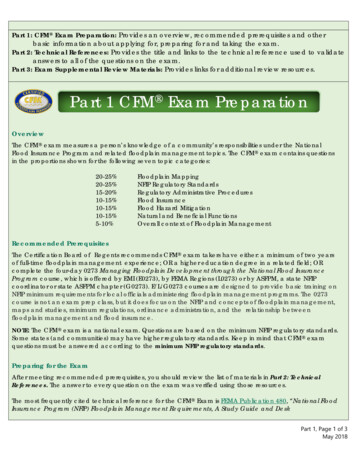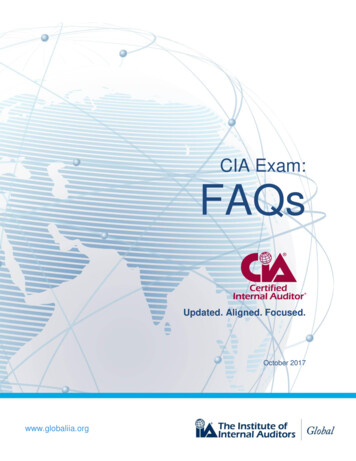
Transcription
CIA Exam:FAQsUpdated. Aligned. Focused.October 2017www.globaliia.org
CIA Exam Syllabi ‒ Updated, Aligned, FocusedTo assist our Certified Internal Auditor (CIA ) certification candidates, thisFrequently Asked Questions (FAQs) document was created to provide answers tocommon questions certification candidates may have related to the CIA Exam Syllabirevisions.We are excited to share the updates with you, and are confident that you willappreciate the greater clarity, uniformity, and alignment with the InternationalStandards for the Professional Practice of Internal Auditing offered by the new threepart CIA exam. We also created a more in-depth handbook, CIA Exam: Why and HowIt’s Changing, to provide further clarification. Read below for a quick overview of therevisions.FAQs1. What is a CIA exam syllabus?An exam syllabus is essentially an outline that summarizes the topics covered on anexam. There is a separate syllabus for each part of the CIA exam (CIA Part One, CIAPart Two, and CIA Part Three). Together, the three CIA syllabi serve as a guide tohelp candidates identify the content on which they will be tested to demonstratetheir internal audit knowledge and proficiency and earn the CIA certification.2. Why did the CIA exam syllabi change?The purpose of the three-part CIA exam is to identify individuals who meet therequisite global competencies in current internal audit practice.To ensure that the exam’s content remains current and valid, The IIA periodicallyconducts a CIA global job analysis study, whereby The IIA reaches out to candidates,certification holders, academics, experienced internal audit professionals, and otherstakeholders around the world to determine the knowledge, skills, and abilitiesmost relevant to today’s internal audit professionals. The IIA conducted a global CIAjob analysis study in early 2017. An external psychometrician was contracted toensure the independence of the CIA job analysis study. The results of the studyconfirmed the need to make revisions to the current three-part CIA exam.3. Is the CIA exam still a three-part exam?Yes, the CIA program requires the successful completion of exam Part One, PartTwo, and Part Three.2
4. What hasn’t changed?CIA candidates must continue to meet the same program eligibility requirements.The number of questions on each exam part and the time allotted to complete theexam part also remains the same: Part 1 – 125 questions, 2.5 hours (150 minutes)Part 2 – 100 questions, 2 hours (120 minutes)Part 3 – 100 questions, 2 hours (120 minutes)5. What is the passing score for the new CIA exams?The IIA will conduct beta testing and a standard-setting study based on the revisedCIA syllabi. The IIA’s Professional Certifications Board will use these results todetermine the passing score of the exams. For each CIA exam part, a raw score (thenumber of items answered correctly) will be converted into a scaled score rangingfrom 250 to 750 points. A scaled score of 600 or higher is required to pass a CIAexam.6. Will successful completion of CIA Part One continue to be required to obtain theCRMA designation?Yes. Candidates seeking the CRMA designation will be required to successfullycomplete CIA Part One to meet the CRMA certification requirements.7. Will the revised exams affect my Internal Audit Practitioner designation?Candidates who applied for the Internal Audit Practitioner designation and successfullycompleted CIA Part One will retain the designation.8. How have the CIA exam syllabi changed?The topic areas on each CIA exam syllabus have been revised to: Bring the exams up to date with the current global practice of internal auditing.Create greater alignment between the CIA syllabi and The IIA’s InternationalStandards for the Professional Practice of Internal Auditing.Minimize duplication and overlap among the three exam parts.Clarify the knowledge, skills, and abilities that exam candidates must possess inorder to pass the exam.The following provides a high-level overview of noteworthy changes to each exampart. For more specific changes and a reference list, candidates should refer to thecomplete exam syllabi found in the “CIA Exam: Why and How It’s Changing,”document.3
CIA Part OneAdditional noteworthy elements related to the revised CIA Part One exam syllabus: IPPF elements such as the Mission of Internal Audit and Core Principles for theProfessional Practice of Internal Auditing are included.The syllabus features greater alignment with The IIA’s Attribute Standards.The exam covers the differences between assurance and consulting engagements.The exam covers appropriate disclosure of conformance vs. nonconformance with theStandards.The largest domain is “Governance, Risk Management, and Control,” which makes up35% of the exam.A portion of the exam requires candidates to demonstrate a basic comprehension ofconcepts; another portion requires candidates to demonstrate proficiency in theirknowledge, skills, and abilities.CIA Part TwoAdditional noteworthy elements related to the revised CIA Part Two exam syllabus: 4The syllabus features greater alignment with The IIA’s Performance Standards.The exam covers the chief audit executive’s responsibility for assessing residual risk andcommunicating risk acceptance.The largest domain is “Performing the Engagement,” which makes up 40% of the exam.A portion of the exam requires candidates to demonstrate a basic comprehension ofconcepts; another portion requires candidates to demonstrate proficiency in theirknowledge, skills, and abilities.
CIA Part ThreeAdditional noteworthy elements related to the revised CIA Part Three examsyllabus: The number of topics covered on the Part Three exam has been greatly reduced.The exam syllabus features a new subdomain on data analytics.The information security portion of the exam has been expanded to include additionaltopics such as cybersecurity risks and emerging technology practices.The largest domain is “Business Acumen,” which makes up 35% of the exam.A portion of the exam requires candidates to demonstrate a basic comprehension ofconcepts; another portion requires candidates to demonstrate proficiency in theirknowledge, skills, and abilities.9. When will the revised CIA exams, based on the updated exam syllabi, be released?The updated CIA exams are expected to be released January 2019 initially in Englishonly. The updated CIA exams in non-English languages will be released graduallybeginning in 2019.A transition plan for non-English languages will be released in the first quarter of2018, after consultation with IIA local affiliates around the world. Existing nonEnglish language exams will remain available to candidates until the new CIA examsare translated. For the most up-to-date information regarding transitioning nonEnglish languages to the revised CIA exam syllabi, visit the CIA Exam SyllabiChanges web page.5
10. When can I apply or register for the new CIA exam?Individuals may apply to the CIA program at any time. Once approved into theprogram, candidates have four years to complete the program. As an approvedindividual, a candidate can then register for the exam, at which point, the candidatehas 180 days (unless the registration window extends beyond the candidate’sprogram expiration date) to schedule and sit for an exam.If a candidate chooses to sit for the new exam, the candidate should register for theexam no sooner than 180 days prior to the exams’ release.11. If I already passed a CIA exam part, do I have to retake it?No. CIA candidates retain credit for successfully completed exam parts. CRMAcandidates who successfully complete CIA Part One as the CRMA eligibilityrequirement will also retain credit for Part One.12. Will I be able to take a CIA exam part before the new exams are released?Yes. CIA exam candidates will be able to register and sit for the current exams untilthe revised exams are available in January 2019 (English version only).13. Do I have the option of taking the existing CIA exams or the revised exams?Candidates will continue to sit for the current exams until the revised exams arereleased, initially in English in January 2019, followed by additional languages. Uponrelease of the revised CIA exams, the previous CIA exams will be retired and will nolonger be available.Additionally, The IIA will begin beta testing in English only, based on the revised CIAexam syllabi, in July 2018 at select Pearson VUE test centers. Those interested intaking a CIA beta exam part before 2019, may indicate interest by creating a “newincident” in CCMS and typing “Beta Test Inquiry” in the summary line. An IIA staffmember will respond with eligibility requirements and additional information.14. Where can I find study materials to prepare for the new CIA exams?We found that each candidate chooses different methods to prepare for the CIAexams. The following is not an exhaustive list, but a few suggestions: Utilize and study the reference materials, which are listed at the end of thesyllabus for each CIA exam part in the CIA Exam: Why and How It’s Changinghandbook; Utilize the study materials developed by review course providers. Contactthem directly to learn about the availability of updated CIA study materials; Participate in CIA preparation training provided by IIA chapters and affiliates.Contact your local affiliate if English is not your primary language.6
15. Will the CIA exams cost more money?The CIA exam application and registration fees will remain the same. For pricinginformation, visit The IIA’s certification Pricing Structure web page.16. I already hold the CIA certification. Will this change affect me?No. Candidates who have successfully completed all three CIA exam parts andearned the CIA certification do not need to take any action other than fulfillingannual continuing professional education (CPE) requirements.17. Where can I find additional information?IIA Global created a handbook to provide additional information. Visit the CIA ExamSyllabi Changes web page to download the handbook today.18. Who do I contact if I have additional questions?The IIA’s Customer Relations team is available to assist CIA candidates. Call 1-407937-1111 or email CustomerRelations@theiia.org.7
Utilize the study materials developed by review course providers. Contact them directly to learn about the availability of updated CIA study materials; Participate in CIA preparation training provided by IIA chapters and affiliates. Contact your local affiliate if English is not your primary language.

